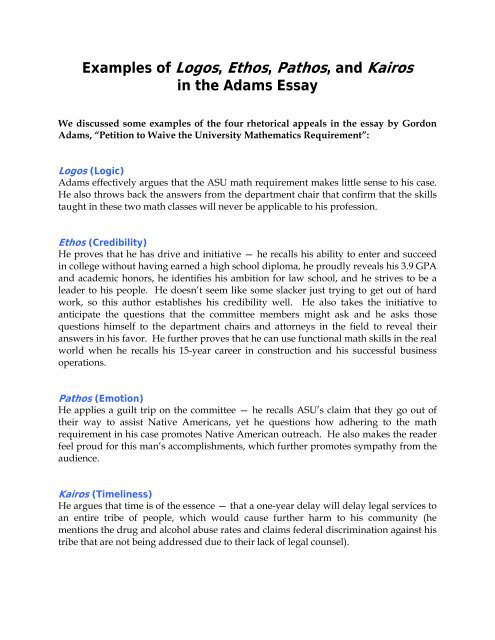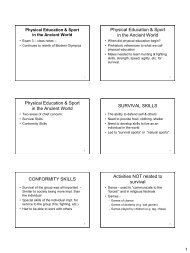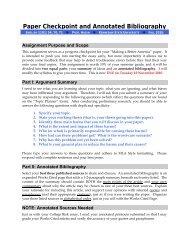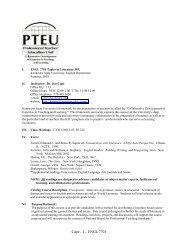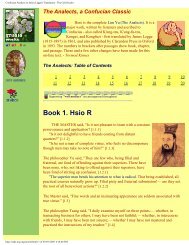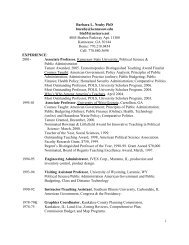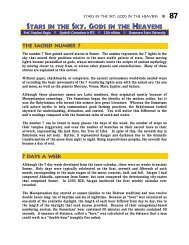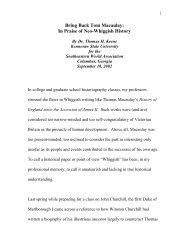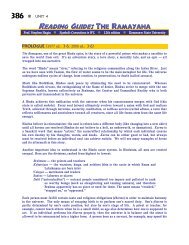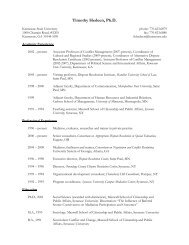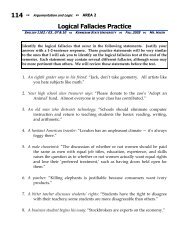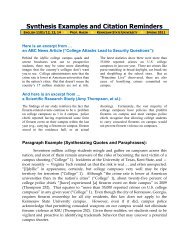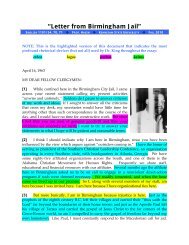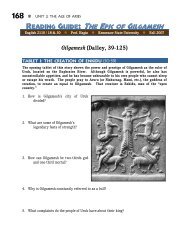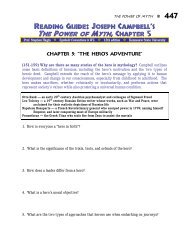Examples of Logos, Ethos, Pathos, and Kairos in the ... - KsuWeb
Examples of Logos, Ethos, Pathos, and Kairos in the ... - KsuWeb
Examples of Logos, Ethos, Pathos, and Kairos in the ... - KsuWeb
You also want an ePaper? Increase the reach of your titles
YUMPU automatically turns print PDFs into web optimized ePapers that Google loves.
<strong>Examples</strong> <strong>of</strong> <strong>Logos</strong>, <strong>Ethos</strong>, <strong>Pathos</strong>, <strong>and</strong> <strong>Kairos</strong><br />
<strong>in</strong> <strong>the</strong> Adams Essay<br />
We discussed some examples <strong>of</strong> <strong>the</strong> four rhetorical appeals <strong>in</strong> <strong>the</strong> essay by Gordon<br />
Adams, “Petition to Waive <strong>the</strong> University Ma<strong>the</strong>matics Requirement”:<br />
<strong>Logos</strong> (Logic)<br />
Adams effectively argues that <strong>the</strong> ASU math requirement makes little sense to his case.<br />
He also throws back <strong>the</strong> answers from <strong>the</strong> department chair that confirm that <strong>the</strong> skills<br />
taught <strong>in</strong> <strong>the</strong>se two math classes will never be applicable to his pr<strong>of</strong>ession.<br />
<strong>Ethos</strong> (Credibility)<br />
He proves that he has drive <strong>and</strong> <strong>in</strong>itiative — he recalls his ability to enter <strong>and</strong> succeed<br />
<strong>in</strong> college without hav<strong>in</strong>g earned a high school diploma, he proudly reveals his 3.9 GPA<br />
<strong>and</strong> academic honors, he identifies his ambition for law school, <strong>and</strong> he strives to be a<br />
leader to his people. He doesn’t seem like some slacker just try<strong>in</strong>g to get out <strong>of</strong> hard<br />
work, so this author establishes his credibility well. He also takes <strong>the</strong> <strong>in</strong>itiative to<br />
anticipate <strong>the</strong> questions that <strong>the</strong> committee members might ask <strong>and</strong> he asks those<br />
questions himself to <strong>the</strong> department chairs <strong>and</strong> attorneys <strong>in</strong> <strong>the</strong> field to reveal <strong>the</strong>ir<br />
answers <strong>in</strong> his favor. He fur<strong>the</strong>r proves that he can use functional math skills <strong>in</strong> <strong>the</strong> real<br />
world when he recalls his 15-year career <strong>in</strong> construction <strong>and</strong> his successful bus<strong>in</strong>ess<br />
operations.<br />
<strong>Pathos</strong> (Emotion)<br />
He applies a guilt trip on <strong>the</strong> committee — he recalls ASU’s claim that <strong>the</strong>y go out <strong>of</strong><br />
<strong>the</strong>ir way to assist Native Americans, yet he questions how adher<strong>in</strong>g to <strong>the</strong> math<br />
requirement <strong>in</strong> his case promotes Native American outreach. He also makes <strong>the</strong> reader<br />
feel proud for this man’s accomplishments, which fur<strong>the</strong>r promotes sympathy from <strong>the</strong><br />
audience.<br />
<strong>Kairos</strong> (Timel<strong>in</strong>ess)<br />
He argues that time is <strong>of</strong> <strong>the</strong> essence — that a one-year delay will delay legal services to<br />
an entire tribe <strong>of</strong> people, which would cause fur<strong>the</strong>r harm to his community (he<br />
mentions <strong>the</strong> drug <strong>and</strong> alcohol abuse rates <strong>and</strong> claims federal discrim<strong>in</strong>ation aga<strong>in</strong>st his<br />
tribe that are not be<strong>in</strong>g addressed due to <strong>the</strong>ir lack <strong>of</strong> legal counsel).
Fur<strong>the</strong>r Critique <strong>and</strong> Discussion<br />
Notice that Adams establishes his credibility very effectively, <strong>and</strong> this can be<br />
demonstrated by <strong>the</strong> length <strong>of</strong> <strong>the</strong> examples above. Notice that this type <strong>of</strong> argument<br />
would normally be made by some lazy student look<strong>in</strong>g to scam <strong>the</strong> system, so Adams<br />
knows that his request <strong>and</strong> his motivation for mak<strong>in</strong>g it will be met <strong>in</strong>itially with<br />
skepticism by <strong>the</strong> committee. Adams knows that he must focus on every possible<br />
question about his character <strong>and</strong> <strong>in</strong>tentions, so he develops several examples to justify<br />
his unique circumstances.<br />
Yes, Adams also writes logically <strong>and</strong> passionately (without be<strong>in</strong>g snooty or rude), but<br />
<strong>the</strong> logic <strong>and</strong> passion would not carry <strong>the</strong> argument on <strong>the</strong> committee without <strong>the</strong>ir<br />
sympathy. He achieves pathos by develop<strong>in</strong>g a strong sense <strong>of</strong> ethos.<br />
So, what we see here is an example <strong>of</strong> a very strong, valid argument, <strong>and</strong> its validity<br />
stems from <strong>the</strong> strength <strong>in</strong> all four areas <strong>of</strong> <strong>in</strong>fluence (logos, ethos, pathos, <strong>and</strong> kairos).<br />
Therefore, one lesson learned from this is that a good college op<strong>in</strong>ion paper needs to be<br />
strong <strong>in</strong> all four <strong>of</strong> <strong>the</strong>se areas.<br />
Had Adams been weak <strong>in</strong> any one <strong>of</strong> <strong>the</strong>se, he would have created holes <strong>in</strong> his claim<br />
that could easily make his argument’s effectiveness fall apart. However, many<br />
arguments still reta<strong>in</strong> <strong>the</strong>ir strength even with weak moments, but <strong>the</strong>se are all<br />
determ<strong>in</strong>ed by <strong>the</strong> context: <strong>the</strong> audience, <strong>the</strong> situation, <strong>the</strong> immediacy <strong>of</strong> action, etc.<br />
Here’s a question: “Is Adams’ argument flawed <strong>in</strong> any way?”<br />
The answer is yes.<br />
This essay is not perfect. Some punctuation <strong>and</strong> mechanical errors exist, many <strong>of</strong> his<br />
examples redundantly repeat <strong>the</strong> same claims, <strong>and</strong> he uses <strong>the</strong> university’s lower<br />
adm<strong>in</strong>istration (<strong>the</strong> department chair) aga<strong>in</strong>st <strong>the</strong> upper adm<strong>in</strong>istration, which <strong>of</strong>ten<br />
can be considered unethical.<br />
The biggest flaw <strong>in</strong> his argument is an illogical claim that he will gladly substitute two<br />
o<strong>the</strong>r classes to replace <strong>the</strong> two required math courses. The logical question <strong>the</strong>n must<br />
be asked: “So, how does <strong>the</strong> class switch get this guy graduat<strong>in</strong>g any sooner?” He still<br />
has to take <strong>the</strong>se two classes, so his graduation date has not been changed by this<br />
maneuver.<br />
However, <strong>the</strong> overall strength <strong>of</strong> <strong>the</strong> argument is evident, <strong>and</strong> <strong>the</strong>refore can survive a<br />
bump <strong>in</strong> <strong>the</strong> road or two. Because his argument is so comprehensive, his strengths far<br />
outpace his weaknesses.


